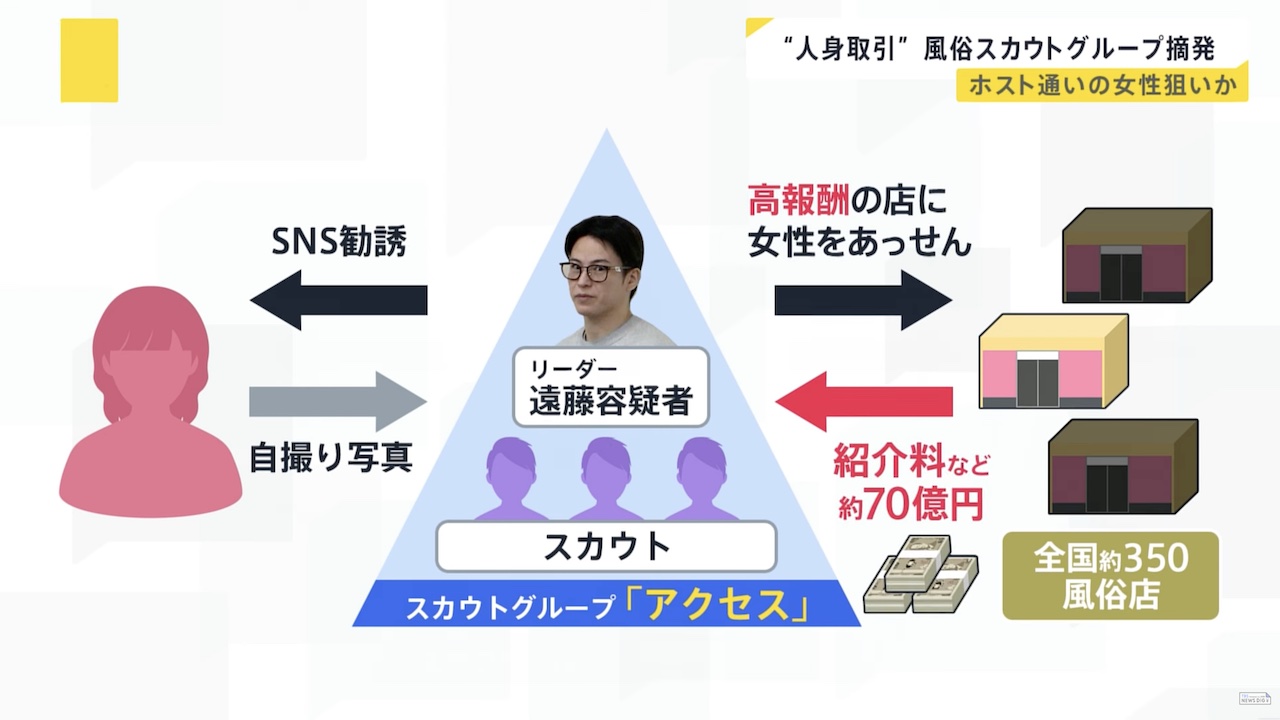TOKYO, Jan 10 (News On Japan) - A leader of a massive scouting group has been arrested on suspicion of introducing women to illegal 'fuzoku' establishments. The group is believed to have earned around 7 billion yen through tactics described as akin to human trafficking.
A woman in her 20s, currently working at a 'fuzoku' establishment, explained, "I spent around 4 million yen on a host last month. I gave everything I earned directly to the host." According to her, the introduction to the illegal establishment began when a friend, already working in the industry, introduced her to a scout.
The man arrested is identified as Endo Kazu, who was re-arrested yesterday on suspicion of introducing women to illegal 'fuzoku' establishments in Beppu City, Oita Prefecture. Endo reportedly led a large group called "Access," which had around 300 scouts. Their method has been compared to human trafficking.
The group's scouts would first approach women on social media and solicit them by requesting selfies. Based on these images, the scouts would select from approximately 350 'fuzoku' establishments nationwide, choosing the ones offering the highest compensation. It is believed that the group earned a total of around 7 billion yen in introduction fees.
Searching for the term 'scout' on social media yields numerous accounts offering to introduce women to 'fuzoku' establishments. These accounts span from Hokkaido to Kyushu, reflecting a nationwide operation. Behind this issue lies the growing problem of predatory host clubs.
A former scout disclosed, "It was common to receive requests from hosts to introduce women to 'fuzoku' establishments. Some of my colleagues at the company engaged in this practice. The methods varied, such as pretending to meet by chance at a bar and befriending the women before suggesting they work at a 'fuzoku' establishment."
The former scout added that hosts also benefited from this arrangement, as it allowed them to track the earnings of women who became regular customers. "Many of the women were driven by financial pressures, needing to earn a certain amount each month."
He further revealed actual conversations with potential recruits, showing how swiftly they could be introduced to establishments. His annual income once reached as high as 20 million yen. He explained that scouts typically received a 10% to 20% commission from the women’s earnings, as long as the women continued working.
In some cases, hosts themselves introduced women to scouts, ensuring that women earned enough to repay their debts. In return, hosts would receive a share of the introduction fees paid by the 'fuzoku' establishments.
Women recruited through scouts often traveled across the country to work, with destinations ranging from Akita in the Tohoku region to Kagawa and Hiroshima in western Japan. One woman commented, "The host would constantly demand money, saying things like 'You're just a source of cash to me.'"
Organizations assisting victims of abusive hosts report receiving numerous consultations. One representative described the situation as "tantamount to human trafficking. Hosts exploit women burdened by debt, pushing them into 'fuzoku' work to repay what they owe. This is a serious issue."
The Metropolitan Police Department's Public Security Bureau has set up a special investigation headquarters to handle the case, marking the first such setup in 30 years since the investigation of Aum Shinrikyo in 1995.
A former scout who previously operated in Kabukicho, Tokyo, remarked, "I hope the bad scouts who collaborate with hosts will stop, but I doubt this business will disappear. Kabukicho is a place where people can make money, no matter what."
Although the leader of the group earning over 7 billion yen has been arrested, concerns remain. Under the Employment Security Act, introducing individuals to 'fuzoku' or prostitution-related work to repay debts is prohibited, yet such practices persist.
Commentator Saito bluntly criticized, "They are despicable. They prey on young women suffering from poverty or low self-esteem, turning them into victims of exploitation. This scheme resembles that of a cult."
Saito also noted that the media and entertainment industry sometimes glorify host club culture as a glamorous profession where people can achieve success, further fueling the issue. "The glamorization of hosts must be reconsidered," he emphasized.
Tanaka, secretary-general of the Parents' Association for Youth Protection, pointed out, "The established scheme of recruiting women into 'fuzoku' through host clubs has become a supply chain feeding the industry. Urgent measures are needed to dismantle this system."
Saito agreed, adding, "This issue reflects deep-rooted societal values in Japan, where self-sacrifice, particularly by women, is often seen as virtuous. This mindset needs to be reevaluated. The idea of treating women as commodities for profit must end, not only in the 'fuzoku' industry but also in the broader entertainment industry."
He further highlighted that many victims hesitate to seek help due to the stigma and fear of being judged by family or friends. Support organizations must strengthen their outreach to those affected.
In response to this ongoing issue, a proposed amendment to the Entertainment Business Act is expected to be submitted during the regular Diet session this month.
Source: TBS















